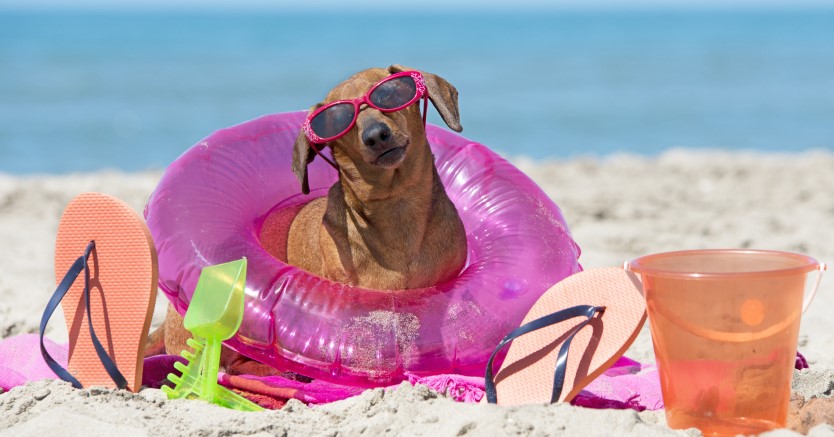Heading to the Beach? Remember Saltwater Is Dangerous for Dogs
Prepare for your upcoming beach trip by having plenty of fresh water on hand for your dog

From digging in the warm sand to splashing in the waves, a visit to the beach is fun for both dogs and their humans. However, a beach trip can pose certain hazards to pets, especially those who enjoy drinking directly from the ocean. Even small amounts of saltwater can cause health problems in canines, such as upset stomach. Gulping down larger amounts could be potentially fatal. Let’s look at why saltwater is dangerous for dogs and how to keep your pet safe while on a beach vacation.
What Exactly Is in Seawater?
To understand exactly why saltwater is dangerous to dogs, let’s look at what exactly is in seawater. The salt that’s found in most oceans comes from two main sources: openings in the seafloor and runoff from the land. This salt contains the same elements that form table salt, including sodium and chloride.
When a human, dog, or other animal drinks seawater, the cells in the body take in the water and salt. Due to the high levels of salt found in seawater, the body is unable to effectively process it, leading to negative health effects.
How Does Saltwater Harm Dogs?
When a dog drinks salt water, the excess amount of salt draws water from the bloodstream and directs it into the intestines. If consumed in small amounts, this can lead to minor dehydration and stomach upset, including symptoms like diarrhea and vomiting.
However, drinking large amounts of saltwater can have a more devastating outcome. As the salt builds up in the body, the cells struggle to release their water content to balance out the excess salt. The result can include seizures, injury to the kidneys, loss of brain cells, and severe dehydration.
In severe cases, drinking saltwater can be fatal for pets. Dogs that have toxic levels of sodium in their systems have a mortality rate of 50 percent or higher, regardless of if the owner seeks treatment.
How Is Saltwater Poisoning in Dogs Treated?
Accidents can happen, especially when you’re having fun at the beach. Your pet may be playing in the water and could ingest saltwater before you have a chance to stop him. When this happens, it’s important to be prepared.
If you know that your pet only consumed a small amount of saltwater, there is usually nothing to worry about. Don’t allow your pet to consume any more and offer fresh water as a replacement. Closely monitor your pet for signs of salt toxicosis, such as weakness, muscle tremors, upset stomach, and seizure activity. Most dogs will recover from drinking a small amount of seawater without any lingering effects.
When dogs consume large amounts of saltwater, medical intervention is often needed. Bring your pet to a veterinarian as soon as possible if he begins exhibiting symptoms. A vet can attempt to restore your pet’s electrolyte balance to normal levels. You want to be cautious doing this yourself as lowering the sodium in the body too quickly can increase the risk of cerebral edema, otherwise known as fluid on the brain.
When at the vet’s office, your dog may receive IV fluids in an attempt to flush away any excess salt from the body. Your vet will also continue to monitor your pet’s electrolyte levels and if necessary, provide treatment for symptoms such as seizures and brain swelling. It can take several days for a dog’s electrolyte balance to be restored, which may require your pet to be hospitalized.
How Can I Keep My Dog Safe at the Beach?
Like most pets, your dog is probably curious about the ocean and will likely want to taste the water. Dogs who are playing in the sun can also get overheated quickly and may turn to ocean water if no other resource is available or close by. To help discourage your pet from drinking saltwater, there are a few strategies you can try.
First, have your pet take frequent breaks away from the ocean. About every 15 to 20 minutes, walk your dog away from the shoreline and to a bowl of cool, fresh water. Also, have a bowl of water near where your pet is playing at all times to reduce the temptation to drink seawater.
While at the beach, keep a good eye on your pet at all times. If necessary, keep your dog on a leash that prevents him from getting too close to the water unless directed by you or another owner.
Ensure that your pet is well-trained before the beach trip. Your pet should know basic commands, such as “no,” which can come in useful when you see your pet attempting to take a drink from the ocean. Reinforce positive behavior by having plenty of fresh water and treats on hand.
Don’t Let Saltwater Ruin Your Fun Beach Vacation
While there are risks involved in bringing your pet to the beach, such as saltwater poisoning, it doesn’t mean that you can’t enjoy a day of sun and sand. By taking the right precautions and being prepared when accidents do occur, you can help keep your pet safe and healthy this summer season.
Ready to start saving money on pet wellness care?
Then take a look at Mint Wellness, the pet wellness plan that provides fast reimbursement on routine pet care. Save on vaccinations, wellness exams, preventatives, dental, and more!
Learn More


